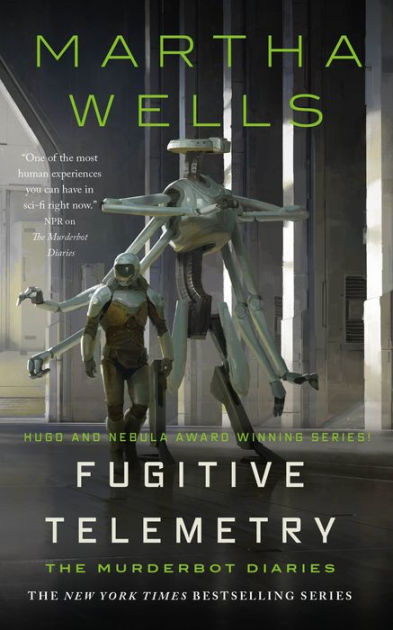 By the end of Chapter 5 of Fugitive Telemetry, the 2021 installment in Martha Wells’ award-winning series The Murderbot Diaries, I was having some deep thoughts about artificial intelligence. (Or what passes for deep thoughts in my aging cranium.) I thought, before humanity goes much further in creating AI, it needs to do some philosophizing, soul searching, and creation of legal and ethical frameworks for the protection both of humanity and of “artificially” intelligent beings.
By the end of Chapter 5 of Fugitive Telemetry, the 2021 installment in Martha Wells’ award-winning series The Murderbot Diaries, I was having some deep thoughts about artificial intelligence. (Or what passes for deep thoughts in my aging cranium.) I thought, before humanity goes much further in creating AI, it needs to do some philosophizing, soul searching, and creation of legal and ethical frameworks for the protection both of humanity and of “artificially” intelligent beings.
Martha Wells is making a lot of points in this splendid series. But this need for doing the legal, ethical, philosophical, etc., heavy lifting in advance is a big one. Of course The Murderbot Diaries is also about workers’ rights, late stage capitalism, PTSD and other psychological maladies, humans’ capacity for doing the wrong thing, and feelings. Especially feelings.
In case you need it, here’s a quick summary: The series takes place in a far human future in which the galaxy is mostly run by immensely powerful corporations. The title character is a rogue corporate Security Unit, a cyborg or construct, part machine part cloned human tissue, neural and otherwise. It prefers to be known just as SecUnit because Murderbot is its private name for itself. (The name, like much of what Murderbot says and does, is laced with multiple tiers of irony.) It and others like it are basically corporate slave labor. (A lot of humans are subjected to slave labor too; the Corporation Rim’s preferred employment scheme seems to be something like the “gig economy” on steroids.) After a horrendous incident before the series begins, it was able to hack its governor module (which is a capital offense) so it doesn’t have to obey the humans or corporations to which it is contracted, but has to be very careful that nobody figures this out. Through the various adventures in previous installments beginning with All Systems Red, it has been given refuge and some autonomy in Preservation, a system outside the Corporation Rim. The evil corporate entity called GreyCris suffered severe physical, fiscal and reputational damage at Murderbot’s hands in previous installments and may or may not be still trying to exact revenge on Murderbot and its new friends and sponsors, particularly Dr. Ayda Mensah, who is the current planetary leader of Preservation. SecUnit had to reveal its independent status to Mensah and the rest of her Preservation team in All Systems Red in order to save their lives.
Fugitive Telemetry takes place after the first three novellas (All Systems Red, Artificial Condition, Rogue Protocol, Exit Strategy) but before the full-length novel Network Effect. As Fugitive Telemetry begins, SecUnit is under contract to assist security at Preservation Station, the satellite that serves as the system’s port of entry. The catch is, it has agreed to not hack into (excuse me, “access”) the station’s security systems, because the security officers are paranoid about having a rogue SecUnit poking around.
Like any good mystery story, this one begins with an unexplained body in a little-used corridor in the Station. Very Agatha Christie-like. SecUnit is hampered by lack of security system access, but comes up with a number of workarounds that amount to slogging gumshoe work, only quicker because its thought processes are a lot faster than those of humans, augmented or otherwise. There are red herrings galore, but suffice it to say that the actual crime is weirder than it appears, and the actual culprit was as much of a surprise to me as it was to Murderbot.
A central point of the series is that the enslavement of sentient beings, whether “born” or created, is unethical. Other writers and artists are exploring this concept in various ways, including the Jeph Jacques in its web comic Questionable Content. But once you start thinking about this, the more problematic it becomes. If AI constructs are to have free will, then indeed we may have to face the possibility of them overpowering or enslaving or just “going berserker” and killing us. Murderbot proves the point repeatedly by demonstrating how much quicker (mentally and physically) it is than humans. Fortunately for the humans it encounters (those who don’t try to harm its clients, that is) he’s more interested in watching TV than wiping out humans. But we probably can’t count on all AI constructs being so benign. So then, we need some way to protect us from them and them from us, which is what I meant by a legal, ethical and philosophical framework. Before we get much farther down the road in boosting the capabilities of AI and neural nets. Of course, humanity is really good at doing the necessary work to prevent future crises, so we probably have nothing to worry about. (In case you can’t tell, that’s an attempt at Murderbot-type sarcasm.)
The plot in Fugitive Telemetry is fairly thin, but the plot isn’t really the point. It’s another step in the development of this already well fleshed-out universe that Wells is creating, and in the development of Murderbot’s personality, and its relationships with humans and with its own feelings. It’s a quick and highly enjoyable read, perfect summer fare.
(Tor, 2021)
[Another main theme in The Murderbot Diaries is trauma and its lasting effects. Wells has written about it from the human point of view in an online-only story. Home: Habitat, Range, Niche, Territory, a short story about Murderbot’s friend Ayda Mensah, is available free to all readers at Tor.com. It originally was free only to those who preordered Network Effect, published in April 2020.]
